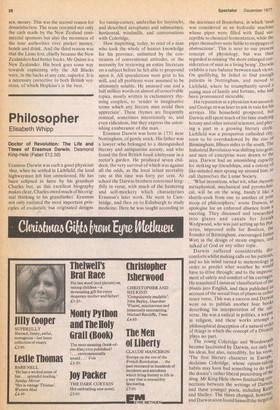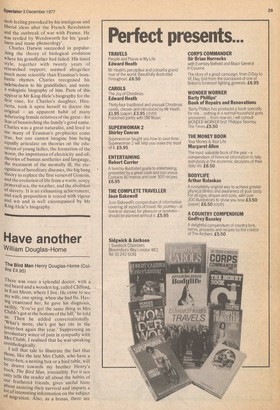Philosopher
Elisabeth Whipp
Doctor of Revolution: The Life and Times of Erasmus Darwin. Desmond King-Hele (Faber £12.50) Erasmus Darwin was such a good physician that, when he settled in Lichfield, the local highwayman left him unmolested. He has been eclipsed in fame by his grandson Charles but, as this excellent biography makes clear, Charles owed much of his original thinking to his grandfather. Erasmus not only outlined the most important principles of evolutio-o,but originated designs for turnip-cutters, umbrellas for haystacks, and described aeroplanes and submarines, horizontal, windmills, and conversations with Coleridge.
How inspiriting, today, to read of a man who took the whole of human knowledge for his province, unlimited by the constraints of conventional attitudes, or the necessity for reviewing an entire literature on a subject before he felt able to propound upon it. All speculations were grist to his mill, and all problems were assumed to be ultimately soluble. He amassed one and a half million words on almost all conceivable topics, mostly written in exclamatory rhyming couplets, to 'render in imaginative terms which any literate man could then appreciate'. These rhymes are frequently comical, sometimes intentionally so, and even ridiculous, but they express the astonishing exuberance of the man.
Erasmus Darwin was born in 1731 near Nottingham, of gentle stock. His father was a lawyer who belonged to a distinguished literary and antiquarian society, and who found the first British fossil ichthysaur in a rector's garden. He produced seven children, the very survival of which was against all the odds, as the local infant mortality rate at this time was forty per cent. At school the Darwin brothers conversed lengthily in verse, with much of the bantering and self-mockery which characterises Erasmus's later work. He went to Cambridge, and then on to Edinburgh to study medicine. Here he was taught according to the doctrines of Booerhave, in which 'man was considered as an hydraulic machine whose pipes were filled with fluid susceptible to chemical fermentation, while the pipes themselves were liable to stoppages or obstructions'. This is near to our present concept of physiology, but was then regarded as misAing 'the more enlarged consideration of man as a living being'. Darwin exhibits a rare balance between such views. On qualifying, he failed to find enough patients in Nottingham, and moved to Lichfield, where he triumphantly saved a young man of family and fortune, who had been pronounced incurable. His reputation as a physician was assured, and George lit was later to ask in vain for his services. His household prospered, but Darwin still spent much of his time studying botany and other natural sciences, and play' ing a part in a growing literary circle. Lichfield was a prosperous cathedral citY, soon to be overshadowed by the rise of Birmingham, fifteen miles to the south. The Industrial Revolution was shifting into gear, and men of enterprise were drawn to the area. Darwin had an astonishing capacity for striking up friendships, and a colony of like-minded men sprang up around him, 10 call themselves the Lunar Society. 'What inventions, what wit, what rhetori metaphysical, mechanical and pyrotechni. cal, will be on the wing, bandy'd like a shuttle-cock from one to another of your troop of philosophers,' wrote Darwin, to apologise for an enforced absence from a meeting. They discussed and researched into glazes and canals for Josiah Wedgwood, who was just setting up his Potteries, improved mills for Boulton, the founder of Birmingham, encouraged James Watt in the design of steam engines, and talked of God or any other topic.
Darwin suffered considerable comforts whilst making calls on his patients. and so his mind turned to meteorology order to predict what weather he would have to drive through; and to the improve' ment of safety and comfort of his carriages. He translated Linnaeus' classification of the plants into English, and then published all account of the sexual lives of plants in rather saucy verse. This was a success and Darwia went on to publish another four books describing his interpretation of the WO' verse. He was a radical in politics, a scePtie in religion, and these works attemPt philosophical description of a natural order of things in which the concept of a DivillitY plays no part. The young Coleridge and Wordsworth became fascinated by Darwin, not only fcr his ideas, but also, incredibly, for his versc The first literary character in EuroPe' declaims. Coleridge, whose opium-taking habits may have had something to do with the doctor's rather liberal prescribing of the drug. Mr King-Hcle shows fascinating coil nections between the writings of Darwih' and these younger poets, including Keat-5 and Shelley. The times changed, however and Darwin soon found himself the target o mob feeling provoked by his irreligious and liberal ideas after the French Revolution and the outbreak of war with France. He Was reviled by Wordsworth for his 'gaudiness and inane phraseology'.
Charles Darwin succeeded in popularising the theory of biological evolution Where his grandfather had failed. His timid Style, together with twenty years of researched support, seemed altogether much more scientific than Erasmus's bombastic rhymes. Charles recognised his Indebtedness to his grandfather, and wrote a eulogistic biography of him. Parts of this aPpear in Mr King-Hele's biography for the first time, for Charles's daughter, Henrietta, took it upon herself to doctor the original — an apparent habit of many infuriating female relatives of the great —for fear of besmirching the family's good name. Charles was a great naturalist, and lived to see many of Erasmus's prophecies come true, but one cannot imagine him being equally articulate on theories on the education of young ladies, the formation of the Moon, the importance of electricity and oil; theories of human aesthetics and language, the treatment of the mentally ill, the recognition of hereditary diseases, the big bang theory to replace the first verses of Genesis, and the evolution of life from a warm, soupy primeval sea, the weather, and the abolition Of slavery. It is an exhausting achievement, and each proposition is voiced with vigour and wit and is well encompassed by Mr king-Hele's biography.











































 Previous page
Previous page